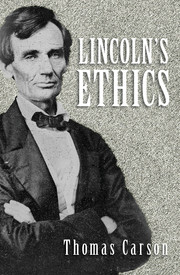1 - Introduction
Published online by Cambridge University Press: 05 May 2015
Summary
Unlike most other important leaders and historical figures, Abraham Lincoln is generally regarded as a singularly good and virtuous human being. The mythical Lincoln many Americans learn about as schoolchildren is “Honest Abe,” who walked many miles from his store to return a few pennies to someone who had been overcharged and, at great difficulty to himself, faithfully paid off his debts from his failed store. He was a self-made man who was almost completely self-educated. His family was shockingly poor and lived one winter in a three-sided cabin, with the fourth side open and exposed to the elements. He was a “rail splitter” who did hard manual labor and was a man of the people with a great sense of humor – everyone loved to hear his stories and jokes. He was a kind and patient husband to a difficult and troubled woman. He was an exceptionally kind and compassion- ate person who was deeply distressed by his first encounter with slavery in New Orleans as a young man. Later, he was moved by his deep compassion and strong sense of justice to become the Great Emancipator. He was a resolute and determined commander in chief despite his great compassion for the immense suffering caused by the Civil War.
This narrative of Lincoln's life is a wonderful national myth that exalts genuinely good and admirable qualities. The mythical Lincoln is a thoroughly marvelous and lovable human being and an excellent model for people to admire and emulate.
But we must ask, is this myth true? In particular, how much of the myth about Lincoln's moral goodness is true? It is the aim of this book to show that the myth is accurate for the most part: cynics would be surprised and confounded by how much truth there is in the myth. And, in some important ways, it even understates his goodness and virtue.
Information
- Type
- Chapter
- Information
- Lincoln's Ethics , pp. 1 - 20Publisher: Cambridge University PressPrint publication year: 2015
